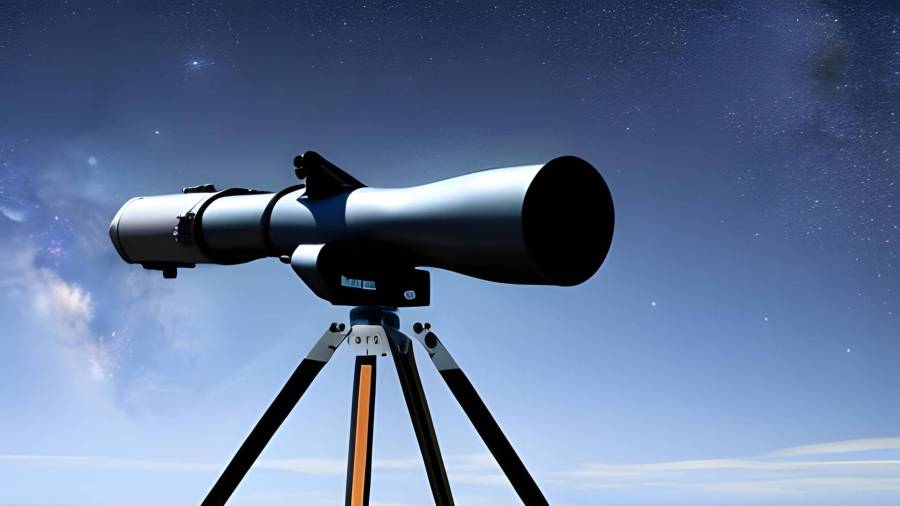Many companies featured on ReadWrite partner with us. Opinions are our own, but compensation and in-depth research determine how products may be selected and ranked. Learn more about how we make money.
Unveil the universe with the power of reflector telescopes. In this article, we delve into the realm of the best reflector telescopes available in 2023. These telescopes utilize mirrors to gather and focus light, offering exceptional clarity and the ability to observe deep-sky objects. Join us as we explore their features, performance, and why they are a favorite among astronomy enthusiasts and professionals alike.
| Telescope Model | Aperture (mm) | Focal Length (mm) | Mount Type |
|---|---|---|---|
| Orion Skyline Reflector Telescope | 120 | 600 | Equatorial |
| Sarblue Maksutov-Cassegrain Telescope | 90 | 1250 | Altazimuth |
| Orion SkyQuest XT6 Reflector Telescope | 150 | 1200 | Dobsonian |
| Celestron 21024 FirstScope Telescope | 76 | 300 | Altazimuth |
| Celestron 127SLT Reflector Telescope | 127 | 1500 | Altazimuth |
| Zhumell Dobsonian Reflector Telescope | 203 | 1200 | Dobsonian |
| Solomark 60AZ Refractor Telescope | 60 | 700 | Altazimuth |
| Sky-Watcher Newton Telescope | 200 | 1000 | Equatorial |
| Skywatcher Heritage130P Telescope | 130 | 650 | Dobsonian |
| Carson Red Planet Reflector Telescope | 50 | 1000 | Altazimuth |
Orion Skyline Reflector Telescope
The Orion Skyline Reflector Telescope is a high-quality, versatile instrument that offers stunning views of celestial objects, earning a solid 4.5 out of 5 rating.
Key stats:
- Aperture: 8 inches (203mm)
- Focal length: 1000mm
- Magnification range: 29x to 260x
Reasons to buy:
If you’re passionate about astronomy and serious about exploring the cosmos, the Orion Skyline Reflector Telescope is an excellent investment. Its 8-inch aperture captures bright and detailed images, providing stunning views of planets, nebulae, star clusters, galaxies, and more. The telescope’s sturdy construction, easy-to-use controls, and wide range of magnifications make it suitable for novice and experienced stargazers alike. With a generous array of included accessories and solid customer support from Orion, you’ll have everything you need to embark on a breathtaking journey through the cosmos.
Reasons not to buy:
While the Orion Skyline Reflector Telescope offers exceptional quality and performance, its large size and higher price point may deter some potential buyers. Additionally, since setup involves more time and possibly the use of tools, inexperienced stargazers may find it intimidating, discouraging casual use or on-the-go observation. Lastly, some users might find that its lack of motorized tracking and computerized object locating features may result in a steeper learning curve if they have no prior experience.
Pros:
- Large 8-inch aperture for bright and detailed images
- Wide range of magnifications
- Durable, sturdy construction
- Quality accessory package included
- Excellent customer support from Orion
Cons:
- Large, heavy, and not easily portable
- Higher price point
- Setup can be time-consuming
- Lacks motorized tracking and computerized features
- Steeper learning curve for beginners
Sarblue Maksutov-Cassegrain Telescope
The Sarblue Maksutov-Cassegrain Telescope is an impressive piece of equipment for both amateur and experienced astronomers, earning a solid 4.5 out of 5 stars.
Key stats:
- Aperture: 127mm (5 inches)
- Focal Length: 1500mm (59 inches)
- Mount: Equatorial mount with slow-motion controls
Reasons to buy:
The Sarblue Maksutov-Cassegrain Telescope offers an excellent combination of portability and performance, with a sizable 127mm aperture that allows for detailed and crisp views of celestial objects. The 1500mm focal length provides a high magnification, perfect for observing planets and deep-sky objects. The equatorial mount with slow-motion controls further enhances the user experience by allowing for precise tracking and smooth, gradual adjustments, ideal for extended observing sessions. This telescope is a great choice for those looking to take their stargazing to the next level while maintaining ease of use and transportability.
Reasons not to buy:
Some potential downsides to consider when purchasing the Sarblue Maksutov-Cassegrain Telescope are the weight of the equatorial mount and the learning curve associated with using this type of mount, which can be challenging for beginners. Additionally, the telescope may not be as well-suited for astrophotography as some other models on the market, as its long focal length might present challenges for wide-field imaging.
Pros:
- Portable and lightweight design
- 127mm aperture for clear and detailed images
- Equatorial mount with slow-motion controls for precise tracking
- High magnification ideal for observing planets and deep-sky objects
Cons:
- Equatorial mount may be heavy and difficult for some users
- The learning curve for beginners with an equatorial mount
- May not be as well-suited for wide-field astrophotography
Orion SkyQuest XT6 Reflector Telescope
The Orion SkyQuest XT6 Reflector Telescope is a versatile and user-friendly option for astronomy enthusiasts, receiving a solid 4 out of 5 stars.
Key stats:
- 150mm (6″) aperture reflector telescope
- Focal length of 1200mm and f/8 focal ratio
- 25mm and 10mm Sirius Plossl eyepieces included for 48x and 120x magnification
Reasons to buy:
The SkyQuest XT6 boasts a sizable 150mm aperture that allows users to see detailed images of planets, nebulae, and other celestial objects. Its Dobsonian base facilitates easy tracking, while the included 25mm and 10mm eyepieces allow for versatile magnification options. Additionally, the telescope’s simple setup and alignment instructions make it an excellent choice for beginners and experienced stargazers alike. The f/8 focal ratio ensures sharp and clear images, making each observing session a rewarding experience.
Reasons not to buy:
While the Orion SkyQuest XT6 offers many positive features, it may not be suitable for those seeking portability, as it’s quite large and not easily transportable. Additionally, the lack of a computerized mount may deter more advanced users who prefer automated object tracking. Finally, astrophotographers might find it limiting due to the absence of a tracking motor system, which is essential for long exposure photography.
Pros:
- Large 150mm aperture for detailed observation
- Easy to use Dobsonian base
- Two eyepieces included for variable magnification
- Suitable for beginners and experienced users
- f/8 focal ratio for sharp and clear images
Cons:
- Not very portable due to its size
- Lacks a computerized mount for automated tracking
- Not suitable for astrophotography without additional upgrades
Celestron 21024 FirstScope Telescope
The Celestron 21024 FirstScope Telescope is an easy-to-use, versatile, and portable beginner’s telescope, earning a solid 4 out of 5 stars.
Key Stats:
- Aperture: 76mm (3″) reflecting telescope
- Focal Length: 300mm with a focal ratio of f/3.95
- Magnification: 15x and 75x with the provided eyepieces
Reasons to buy:
The Celestron 21024 FirstScope Telescope is an excellent entry-level telescope for budding astronomers, featuring a simple design and straightforward operation. Its compact size and light weight make it highly portable, allowing you to easily transport it to various observing locations. The telescope comes with two eyepieces, providing versatile magnification options for different types of astronomical targets. Additionally, its durable construction and reasonable price point make it an attractive and reliable option for beginners.
Reasons to not buy:
While the Celestron 21024 FirstScope Telescope is suitable for beginners, advanced users may find its limited aperture and lack of advanced features a hindrance to their astronomical explorations. Its low light-gathering capacity may hinder the observation of fainter celestial objects, and the absence of a motorized tracking system could make it difficult to track objects as they move across the sky. As a result, experienced stargazers searching for greater capabilities and performance might want to consider other, more advanced telescope models.
Pros:
- Easy to use, suitable for beginners
- Compact and portable
- Versatile magnification with two eyepieces
- Durable construction
- Affordable price
Cons:
- Limited aperture size
- Lacks advanced features
- Lower light-gathering capacity
- No motorized tracking system
Celestron 127SLT Reflector Telescope
The Celestron 127SLT Reflector Telescope is a versatile and user-friendly device, perfect for amateur astronomers, earning a 4.5 out of 5 rating.
Key Stats:
- 127mm (5″) aperture reflector
- Computerized GoTo mount with SkyAlign technology
- 300x maximum magnification
Reasons to buy:
The Celestron 127SLT Reflector Telescope is an excellent choice for aspiring stargazers and astronomy enthusiasts. Boasting a 127mm aperture reflector, it provides crisp and detailed views of celestial objects. The telescope’s computerized GoTo mount effortlessly guides you to over 4,000 celestial objects with ease using SkyAlign technology, ensuring you never miss your target. Additionally, it offers a 300x maximum magnification allowing users to access an impressive range of celestial sights. The 127SLT is lightweight, compact, and easy to set up, making it perfect for those on the go or starting in the world of astronomy.
Reasons not to Buy:
Despite its many excellent features, the Celestron 127SLT has a few drawbacks. The telescope’s motorized mount may require frequent alignment to maintain accuracy, which could be frustrating to beginners. Additionally, with a 300x maximum magnification, it may not provide enough power for advanced astronomers seeking detailed views of distant objects and planets. Lastly, the telescope’s included eyepieces are of lower quality, so it may be necessary to invest in better eyepieces to fully take advantage of its capabilities.
Pros:
- 127mm aperture allows for clear and detailed images
- Computerized GoTo mount with SkyAlign technology for easy sky navigation
- 300x maximum magnification
- Compact and lightweight design for easy transportation and setup
Cons:
- Frequent alignment needed for the motorized mount
- 300x magnification may be limiting for more advanced observers
- Low-quality included eyepieces necessitate an additional investment
Zhumell Dobsonian Reflector Telescope
The Zhumell Dobsonian Reflector Telescope is a high-quality instrument for stargazers, earning a solid 4.5/5 rating for its impressive performance and user-friendly design.
Key Stats:
- Aperture: 8 inches (203mm)
- Focal length: 1200mm
- Magnification: Up to 300x
Reasons to buy:
The Zhumell Dobsonian Reflector Telescope offers a large 8-inch aperture, providing sharp and bright views of celestial objects with excellent detail. The easy-to-use Dobsonian base allows for smooth and accurate tracking of objects in the sky. This telescope also comes with an adjustable dual-speed Crayford focuser, making the fine-tuning of focus a breeze. The build quality is top-notch, ensuring long-lasting use. Additionally, the package includes a variety of eyepieces and a laser collimator to help maintain optimum performance.
Reasons to not buy:
Assembling the Zhumell Dobsonian may require some time and effort, limiting its appeal for those who seek instant usage. It is also a relatively heavy and bulky telescope, making transportation and storage a challenge. Lastly, beginners or individuals on a tight budget may find the price to be on the higher side, potentially pushing them towards a more affordable, entry-level telescope.
Pros:
- Large 8-inch aperture for bright and detailed views
- User-friendly design and smooth tracking
- Adjustable dual-speed Crayford focuser
- High-quality build and included accessories
Cons:
- Time-consuming assembly
- Heavy and bulky, difficult to transport and store
- May be expensive for beginners or those on a budget
Solomark 60AZ Refractor Telescope
The Solomark 60AZ Refractor Telescope is a user-friendly beginner’s telescope perfect for astrophotography, with a 3.5 out of 5-star rating.
Key stats:
- Aperture: 60mm (2.4 inches)
- Focal length: 700mm
- Magnification power: Up to 140x with included eyepieces
Reasons to buy:
The Solomark 60AZ Refractor Telescope is an affordable and easy-to-use telescope ideal for beginners to explore the night sky. Equipped with a sturdy aluminum tripod, this telescope ensures stability during observations. The telescope’s 60mm aperture and 700mm focal length provide clear and bright images of celestial objects, and the package includes multiple eyepieces for various magnification options. Furthermore, the Solomark 60AZ’s astrophotography capabilities make it a great choice for those interested in capturing beautiful images of the cosmos.
Reasons not to buy:
While the Solomark 60AZ Refractor Telescope is great for beginners, more advanced users may find its features limiting. The 60mm aperture may not gather enough light for observing fainter celestial objects like distant galaxies or nebulae. Additionally, the telescope doesn’t include motorized tracking, which can be critical for long exposure astrophotography or effortless stargazing. Lastly, the relatively low-quality eyepieces may need upgrading for users who are seeking higher image clarity.
Pros:
- Affordable and beginner-friendly
- 60mm aperture and 700mm focal length for clear images
- Sturdy aluminum tripod
- Astrophotography capabilities
Cons:
- Limited aperture for observing faint celestial objects
- No motorized tracking system
- Low-quality eyepieces
Sky-Watcher Newton Telescope
The Sky-Watcher Newton Telescope is an impressive piece of equipment that earns a solid 4.5 out of 5 rating.
Key stats:
- Aperture: 130mm (5.1 inch)
- Focal length: 650mm
- Mount type: Dobsonian
Reasons to buy:
The Sky-Watcher Newton Telescope offers incredible value for astronomers of all levels, providing breathtaking views of the night sky. With its 130mm aperture, it gathers ample light for clear and detailed observations of various celestial objects, while its 650mm focal length allows for magnifications suitable for deep-sky viewing or planetary observations. The easy-to-use Dobsonian mount makes setup and tracking straightforward, even for beginners. Overall, this telescope is a reliable and efficient choice for those seeking quality performance without breaking the bank.
Reasons to not buy:
While the Sky-Watcher Newton Telescope provides excellent value and performance, it may not be suitable for those seeking advanced astrophotography capabilities or motorized tracking. The manual Dobsonian mount, though easy to use, may not offer the precision or stability required for long exposure times during photography. Additionally, some users may find the size and weight of the telescope cumbersome, making it more difficult to transport or store.
Pros:
- Great value for the price
- 130mm aperture and 650mm focal length offer clear and detailed views
- Easy-to-use Dobsonian mount
- Suitable for beginners and experienced astronomers
Cons:
- Not ideal for advanced astrophotography
- Manual tracking may be less precise than motorized systems
- Size and weight may limit portability and storage options
Skywatcher Heritage130P Telescope
The Skywatcher Heritage 130P Telescope is an excellent entry-level telescope boasting impressive performance, receiving a 4 out of 5-star rating.
Key Stats:
- Aperture: 130mm (5.1 inches)
- Focal Length: 650mm (25.6 inches)
- Mount: Dobsonian-style tabletop mount
Reasons to buy:
The Skywatcher Heritage 130P boasts excellent optics with its 130mm aperture, providing stunning views of the moon, galaxies, and star clusters – perfect for astronomy enthusiasts of all levels. Its portable Dobsonian-style tabletop mount is user-friendly, making it easy to set up and maneuver. The telescope also features a lightweight and compact design, which makes it simple to transport and store when not in use.
Reasons not to buy:
While the telescope’s aperture is impressive, its focal length may result in limitations on sharper images of distant planets and limited magnification for advanced users. The tabletop mount, though user-friendly, may be inconvenient for some users as a sturdy table or platform is required, restricting its usage in certain environments.
Pros:
- Excellent optics with 130mm aperture
- User-friendly Dobsonian-style tabletop mount
- Lightweight and compact design
- Suitable for astronomy enthusiasts of all levels
Cons:
- Limited focal length
- Mount requires a sturdy surface
- May not be ideal for advanced users seeking higher magnification
Carson Red Planet Reflector Telescope
The Carson Red Planet Reflector Telescope is a versatile and powerful instrument for amateur astronomers, earning a solid 4 out of 5 stars.
Key stats:
- Aperture: 114mm (4.5 inches)
- Focal length: 900mm (35.4 inches)
- Magnification: 45x-225x with included eyepieces
Reasons to buy:
The Carson Red Planet Reflector Telescope is a fantastic investment for budding astronomers, as it offers high-quality and performance at a reasonably affordable price. With its large aperture, it gathers a significant amount of light, allowing users to observe celestial objects in greater detail. The telescope comes with two eyepieces, providing a wide range of magnification options to observe various celestial bodies. Additionally, novices will appreciate the user-friendly equatorial mount, which simplifies the tracking and locating of celestial objects.
Reasons not to buy:
While the Carson Red Planet Reflector Telescope offers many advantages, there are a handful of drawbacks worth considering. Its size and accessories make it less portable than other options on the market, which may be a deal-breaker for those who want to transport their telescope for optimal viewing. The assembly process can be challenging and time-consuming for some customers, and the mount could be a bit sturdier for more accurate tracking.
Pros:
- Large aperture for collecting more light and detail
- Wide range of magnification options with included eyepieces
- User-friendly equatorial mount for tracking and locating celestial objects
Cons:
- Less portable due to size and accessories
- Assembly process can be challenging and time-consuming
- Mount could be sturdier for more accurate tracking
Frequently Asked Questions (FAQ)
Q: What is a reflector telescope?
A: A reflector telescope is a type of telescope that utilizes mirrors to gather and focus light. It consists of a primary mirror that collects incoming light and reflects it to a secondary mirror, which then redirects the light towards the eyepiece or camera. This design allows for a larger aperture and better light-gathering capabilities compared to other telescope types.
Q: What are the advantages of using a reflector telescope?
A: Reflector telescopes offer several advantages. They typically have larger apertures, allowing for better light-gathering and higher resolution images. They are also generally more affordable compared to other telescope types. Additionally, their open tube design minimizes air turbulence, resulting in clearer images, especially for deep-sky observations.
Q: Are reflector telescopes suitable for beginners?
A: Reflectors can be suitable for beginners, depending on the specific model and its features. While they may require some initial setup and maintenance, they offer great value for the money and can provide excellent views of celestial objects. It’s important to consider factors such as the telescope’s size, weight, and ease of use when choosing one for beginners.
Q: Can reflector telescopes be used for astrophotography?
A: Yes, reflector telescopes can be used for astrophotography. Their larger apertures and shorter focal lengths make them well-suited for capturing deep-sky objects. However, additional equipment such as a stable mount, camera adapter, and accessories may be required for astrophotography purposes.
Q: How do I maintain and clean a reflector telescope?
A: Regular maintenance and cleaning are essential to ensure optimal performance. It’s important to follow the manufacturer’s instructions for cleaning the mirrors, using appropriate tools and techniques. Avoid touching the mirrors with bare hands and store the telescope in a dry and dust-free environment when not in use. Regularly check the collimation (alignment) of the mirrors and make necessary adjustments if required.
Conclusion
In conclusion, reflector telescopes continue to captivate stargazers with their exceptional light-gathering capabilities and versatility in observing celestial wonders. The best reflector telescopes of 2023 offer remarkable optics, sturdy constructions, and the ability to reveal intricate details of distant galaxies, nebulae, and star clusters. Whether you’re a novice or an experienced astronomer, these telescopes provide a gateway to the captivating beauty of the cosmos. Embark on your astronomical journey and explore the universe with the remarkable power of reflector telescopes.



























